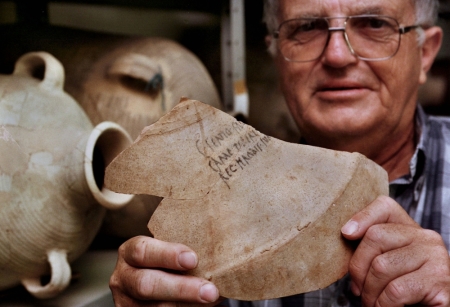2,500-Y-O Judah Soldiers' Handwriting Discovery Proves God's Word Is True, Answers in Genesis Says

Answers in Genesis has said that a discovery relating to handwriting analysis of a text on pottery shards by soldiers in Judah close to 2,500 years ago proves that God's Word is true.
"Scholars have long disputed the level of literacy among ancient Israelites. Many believe only the educated — scribes, priests, royalty, and the bureaucracy — were literate and that the general populace was unable to read and write. But Scripture implies that literacy would be a necessity, even among the general populace," AiG's Avery Foley wrote Tuesday in an article for the Young Earth Creationist organization's website.
The discovery in question refers to findings posted in April by Israel's Tel Aviv University, in the Proceedings of the National Academy of Sciences, which indeed suggested that it was not only the elites who could read.
"We're dealing with really low-level soldiers in a remote place who can write," said Israel Finkelstein, an archaeologist and biblical scholar at Tel Aviv University. "So there must have been some sort of educational system in Judah at that time."
Finkelstein suggested that what this discovery means is that people in the kingdom had the capacity to write and put together parts of the Old Testament even earlier than it was believed.
"There's a heated discussion regarding the timing of the composition of a critical mass of biblical texts, but to answer this, one must ask a broader question: What were the literacy rates in Judah at the end of the First Temple period? And what were the literacy rates later on?" the researcher elaborated.
AiG offered that according to Genesis 5:1, even Adam, the first man in the Bible, had the ability to speak and write.
"It also seems reasonable that the genealogical information in Genesis 5 and 11 was also written down. And given that Noah and his family built the Ark, is it likely that they could not write? The Israelites were commanded to write the commands of the Lord on their doorposts and bind them on their hands and foreheads (Deuteronomy 6:4–9, 11:18–20)," the creationist group continued.
"If they could not read or write, what would be the point of these commands?"
AiG offered that the discussion is important, since some scholars have tried to argue that the biblical texts were not written until after the Babylonians destroyed Jerusalem in 586 BC, which would clash with biblical testimony stating that many of the texts were written as history unfolded.
"Most conservative biblical scholars who start with God's Word believe the Old Testament record that the books were written by the persons associated with them or those who claim to have written them," the article continued.
"They also accept that these books were written during the time period they claim to have been written in (e.g., the prophet Isaiah during the reigns of the pre-exilic kings Uzziah, Jotham, Ahaz, and Hezekiah). If these books were not written until decades or even centuries after the events happened, the historicity, accuracy, and infallibility of the texts are called into question since they claim to have been written much earlier."
Foley reflected on the pottery shards discovery in Judah, and argued that it "supports the accuracy of God's Word," because it shows that Israelites were more literate than many scholars believe.
"If history has taught anything, it's that eventually research and science will confirm Scripture. We have an imperfect and incomplete understanding of history and science, but God's Word was ultimately written by the God who was there and who never lies (Titus 1:2)," the article added.





















